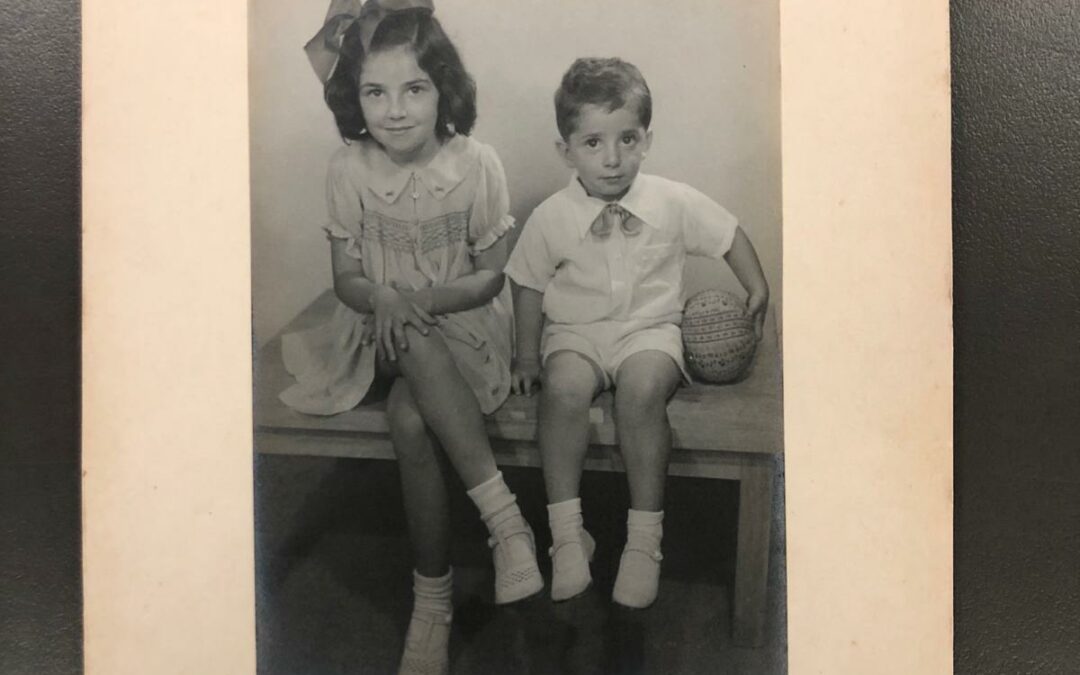A photograph of Naomi and her brother Abner, aged about 6 and 3 respectively.
Once upon a time, a long, loooong time ago, in a country far, far way – there lived a………… and then the story would begin. That is how stories usually started………. However, nowadays there are so many wonderful illustrated books for children that there is no need to make up a story.
When you were little, do you remember sitting on your mother’s lap, or your father’s lap, or your grandparent’s lap – and being read an amazing and interesting story? I hope you do……….. because I do recall being little and cuddled and being read to.
But there is a difference between then and now. Then was about eighty years ago, in the early 1940’s, and today it is already 2024. In those days there were definitely stories especially written for children – but there were definitely not as many, and definitely not about so many different characters and jplaces. I would say that you are more fortunate in a way, than we were, but I, and all the other children in those times, were delighted with the stories and the books that we had.
One of my oldest and favourite books was called “What the Moon Brought”. My brother and I just adored the twins, Ruth and Debbie, who are the main characters in the book and all their adventures. I am not sure if children in today’s times would find them as enjoyable as we and other children did in the early 1940’s.
So what is my story?
I was born on the 8th November, 1938, in Cape Town, South Africa, just before Kristallnacht in Germany – which took place on November 9-10, 1938. Pogroms were unleashed by the Nazis against the Jewish population in Germany and destroyed Jewish businesses, homes and synagogues. It took a few days before the whole world knew what was happening in Germany to the Jewish people.
The whole family, my parents, my grandparents in Cape Town, and my grandparents in Slonim, Poland, and even my great-grandmother, who also lived in Cape Town, were delighted with my birth. Unfortunately, my father’s parents and siblings, although they also rejoiced in my birth, did not live to meet their South African grandchildren, as they are were murdered by the Nazis and their willing helpers..
My parents, Ephraim and Chayele Derman, were new immigrants to South Africa, My father was born inSlonim, Poland, and my mother and her parents, Yosef and Yetta Seltz, and grandmother Esther-Temma Rozenberg, came from Siauliai/Shavel in Lithuania. My father’s parents, Raphael and step-mother, Esther Klibanski Dereczinski, were living in Slonim, Poland. Unfortunately, they and their children as well as many Jews in Slonim and Eastern Europe, were murdered by the Nazis and their willing helpers, as I mentioned previously. My mother, Chayele Seltz Derman, also lost many close family and friends who were murdered by the Nazis. In fact, most Jewish people had relatives and friends who never survived the Nazi atrocities.
Many Jewish people immigrated to South Africa, because of anti-semitism and poor economic conditions in their homelands; there was quite a large immigrant Jewish population in Cape Town. In the 1930’s, when I was born. We all felt safe, especially as Cape Town was very far from where World War II was being fought against the Nazis.
Even though we, the young children of these new immigrants,j were little, we were aware of the war. What were the signs that alerted us to the war being fought in Europe? Well, one of the sayings with which we were familiar, was “Don’t talk about ships or shipping”. Cape Town was the port where war ships, teeming with soldiers, refuelled on their way to North Africa, and was probably a hotbed of spy activity. Second was the fact that all homes had dark blinds installed on windows – in the event that the Germans might bomb the Cape. And thirdly, because of the need to feed the soldiers, food wastage was prohibited. No white bread was allowed, and the slogan was “From crumb to crust, eat you must.”
By the way, my maiden name was Naomi Derman, and now it is Naomi Bloch, as I married Jack Bloch in Cape Town. I had two younger brothers, Abner and Jonathan Raphael Derman. And we all loved stories. We lived in Woodstock, but did not live close to the Jewish community of Woodstock, Cape Town, where there was a shul and a Talmud Torah. My parents valued their Jewish heritage, and we celebrated Shabat and all the Jewish holidays; on those days we did not attend school. They were born in Eastern Europe – Lithuania and Poland – and considered it essential that their children learn about Judaism and to speak and read Hebrew. To this end, my brother, Abner, and I, had Hebrew lessons every Sunday. A Hebrew teacher came to our house and we advanced fairly well. There was a Talmud Torah next to the Woodstock Shul, but it was difficult to get to. There were no Jewish day schools in those days, so my brother and I went to the local primary schools around the corner. I was the only Jewish girl in my class, but there was no anti-semitism of which I was aware. And all our friends were non-Jewish, from the neighbourhood and from the school.
As I am sitting here, writing this article, I am looking at one of our favourite books, which I mentioned earlier, called “What the Moon Brought” by Sadie Rose Weilerstein. It was first published in Philadelphia, U.S.A. in 1942. The book is falling to pieces, unfortunately – which proves how often it was read and how much we enjoyed the stories, which may not appeal to today’s young people.
As my parents first language was Yiddish, and as my grandparents and great-grandmother could not speak English, my first language was Yiddish. And until I went to school that was how I communicated. Many of the shopkeepers – such as the fish shop, the grocer shop, the chemist – were also Jewish, and used to remark on my beautiful Yiddish. Many of the stories read to me were in Yiddish, and I even used to recite poems in Yiddish.
How did we amuse ourselves before all today’s modern forms of entertainment? Well, there was no TV, there were no computers or mobile phones – just the radio and our own inventions of games; we were never bored, and played with neighbouring children. There were special radio programmes for children at a certain time every day, and that kept us entertained.
In order to move closer to the Jewish community, and as Jewish immigrants became financially established, my parents bought a home in Sea Point, Cape Town. There was a large Jewish community there, including my father Ephraim’s sister and brothers. We all settled down happily in our new home and made many new friends, mostly Jewish. Many of our neighbours were Jewish, the Shul and Talmud Torah were just down the road, and the beach was a five minutes walk away, as was the school to which I was enrolled – Ellerslie Girls High.
After I graduated from High School, I registered at the University of Cape Town, to study Bachelor of Commerce, and received my degree in 1960. 1960 was also an eventful year, as I married my husband, Jack Bloch early that year. We settled down to married life, and had two sons, Joel and Danny.
As well as my Commerce degree, I did a post-graduate course in Librarianship, which served to be very useful, both in South Africa and Australia. Here in Melbourne I worked at Technilib, and then at Monash, Melbourne and Swinburne Universities in the cataloguing departments – focusing mainly on Yiddish books.
We all immigrated to Australia in 1987 and settled in Melbourne. I found the move extremely difficult as I had left my beloved parents, who were getting on in years, and my precious younger brothers, Abner and Jonathan.
As the years went by, and my parents and brothers passed away, I managed to make peace with the fact that moving to Melbourne has been for the better. I thank my children and their families for their friendship, and take pride in their achievements, both scholarly and community wise.
But above all, I must mention my parents and brothers, as well as the extended family. My parents, who were both fluent in Hebrew, and ardent Zionists, passed on their love of Judaism and Zionism to us in a variety of ways. For example, when the State of Israel was established in May 1948, we hung an Israeli flag from the balcony of our home. Even though they were migrants, their command of the English language was excellent, and my father even learned Afrikaans. We were taught by example in various ways; such as maintaining close contact with family members and showing them the love and respect due to them; we were lucky in that we had a variety of close uncles, aunts and cousins. My father worked hard to give his family a comfortable upbringing, and, despite not having had a complete school education, or even a tertiary education, he succeeded in making our lives secure. My father Ephraim was dependable, reliable and responsible. My mother, Chayele, was involved with several Jewish charities and settled happily in S. Africa. She taught us, as did our father, that all people are created equal and that apartheid was an anathema and hateful to the human race, to which we all belonged, regardless of race, colour or creed. As a family, my late brothers and I were very close, and dearly loved each other, as well as our families. Thanks for your support and love, Abner and Jonathan. And to my dear husband Jack for his practical approach to life and living – thank you, Jack.
Most of all, however, I must apologise to my mother and father, for not thanking them for providing me with all my needs as I was growing up, for paying for my university education and for instilling in us a love for family, for Israel and humanity. A belated thanks, Mom and Dad.
I am gratified that the Lamm Library wishes to house these children’s books of yesteryear, and thank them.
The books donated to the Lamm Library by Naomi Bloch are as follows:
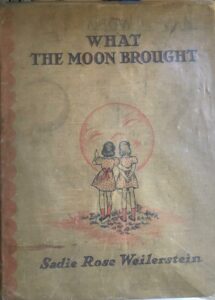
- What the Moon Brought – Sadie Rose Weilerstein – Published 1942
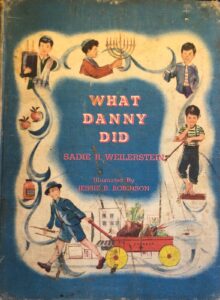
- What Danny Did – Sadie Rose Weilerstein – Published 1944
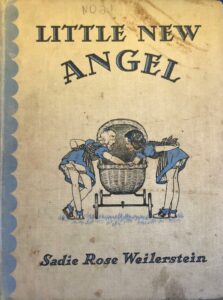
- Little New Angel – Sadie Rose Weilerstein – Published 1947
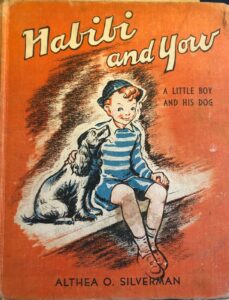
- Habibi and Yow – Althea O. Silverman – Published 1946

